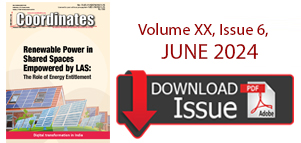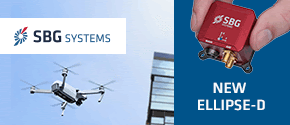| Applications | |
Galileo outage – Reliability is a key factor for GNSS
Is it time for Europe not just to think about the Galileo second generation, but also to start thinking beyond Galileo? |
 |
|
“Until further notice, users may experience service degradation on all Galileo satellites” the Notice Advisory to Galileo Users (NAGU) issued by the European GNSS Service Center on July 18 2019, was not very reassuring for the people using and working on Galileo. When then the outage lasted for several days, things became even more scaring. What was going on with Galileo?
For a pure scientific purpose, and also out of curiosity, thanks to the processing tools available in our research group we started our independent investigation, trying to see what the problem was.
A thing was clear: the position estimated using the Galileo-only satellite or hybrid GPS-Galileo solutions were showing errors on the order of 500 meters or even more, and a dummy receiver not implementing proper checks might have been cheated by the unreliable signals. For some time the Signal in Space (SIS) Accuracy Index (SISA), giving indication of the minimum standard deviation of an overbound of the SIS error, was still at acceptable level, and the only clear evidence that something was wrong and the system should not be used was provided by the ephemeris parameters, that were not up-to date. In fact, according to the Galileo OS SDD (issue 1.1, May 2019) they should not be used when older more than 4 hours [1].
This is the event, as seen by the users, without any insight on what actually happened in some block of the control chain of the overall system. But what could be our remarks on such a global event, and the lesson learnt?
First of all, it is clear that an event like this cannot be underestimated or just considered as a temporary technical issue for a GNSS system that is still providing Initial Services (anyway, this should not be forgotten). Without considering this disruptive event, in the previous months the system was showing very good performance in terms of signals and functionalities, and even during this event it was shown that, replacing the content of the navigation message with valid ephemeris, it was still possible to achieve very good position estimations [2]. The number of Galileo users is constantly growing [3], expectations for the new features of the system such as the High Accuracy Service or the OS NMA are high on the user side, so this event felt like a “stop” to this growing enthusiastic attitude toward the Galileo system. It can also be imagined that the outage might have triggered a number of political issues, considering also the debate at European level about the funding for the satellite, the sensitive balance for the involvement of the different European countries in the management of the programme, and the Brexit coming up.
Reliability is a key factor for GNSS. We know it very well when talking of jamming and spoofing attacks, and we consider not just the technical fact, but the consequences this might have on critical infrastructures, sensitive services and also on mass-market applications used by a large number of people. Still, this kind of attack would deny, partially, some services, in a limited area, while a full system outage like this one made it unusable on a global scale.
An interesting report published in June 2019 [4], analyzes what would be the impact of a 30 days outage of GPS, but also the large economic benefit of using GPS in many different Industry Sectors. The report shows how most of the economic benefit of civil GPS (about 90%), have accrued since 2010. Until some years ago, an event like the Galileo outage would have probably not even be covered by the news, while this event was reported by magazines and tv all over the world. This is a clear evidence of how much our dependency on positioning and timing services grew in the past years, and we see and taste the impact on many ordinary services we use everyday. On the other hand, it confirmed a relevant attention toward Galileo, that, for sure, since its design phase, raised the bar for the civil GNSS, targeting high performance levels and innovative signals and services.
There are for sure a couple of lessons learnt from this event.
GNSS systems are quite a complex infrastructure and that there is still room for improvement. GNSS is fast evolving both on the system side and on the users’ side with more complex receivers and platforms being designed. We are not just yet at the time of implementation of consolidated technologies, and, especially in Europe, there is a strong need for a culture of GNSS which is still developing. Education and training on the multifold discipline of satellite navigation is needed now, to consolidate, for the years to come, a critical mass of researchers, scientists, technicians, service providers, businessmen, skilled on the specificity of GNSS.
The other lesson learnt is that users, and in particular application developers, should be aware of the limitation of GNSS despite of its relevance and utmost importance. For many services it can be the ultimate solution and it needs backups that can compensate temporary outages. This is a fact to be taken into account not just because of the possibility of disruptive system events like the one we faced in July for Galileo, that anyway we expect to be rather rare, but also in case of unavailability on a more local scale. Harsh environments, natural and anthropogenic interferences might always affect and deny the GNSS positioning.
The great emphasis put in these years on the promotion of the downstream market to motivate and justify the development of the new GNSS and the modernization of the old ones, has sometimes made users overconfi dent in GNSS as the ultimate solution to any positioning problem. The use of navigation units integrating GNSS and other sensors should be driven not just by the search for improved accuracy and precision, but also by the need of robust navigation units embedding sensors with complementary features.
Redundancy of the constellations is another way to increase robustness for some applications, but this road cannot always be pursued when you target the use of advanced features such as authenticated signals, or frequencies which are not interoperable.
It is interesting to see how, even in the United States, there are discussions going on, at the highest level, on the need for one (or more) backup technologies to GPS, in order to grant continuity of a positioning service for different classes of applications.
GNSS remains one of the most relevant enabling technology that came into the full light in the past years, and there is no doubt that Galileo represents for Europe a historical step into a new world of science, technology, industry, and business. Anyway, is it time for Europe not just to think about the Galileo second generation, but to start thinking beyond Galileo?
[1] Galileo OS SDD (issue 1.1, May 2019) available at https:// www.gsc-europa.eu/system/fi les/ documents/Galileo-OS-SDD.pdf
[2] F. Dovis, A. Minetto, A. Nardin, E. Falletti,D. Margaria, M. Nicola, M. Vannucchi, “Analysis of the Signal Outage” GPS WORLD. – 30:8(2019), pp. 10-12.
[3] GSA press release: https:// www.gsa.europa.eu/newsroom/ news/usegalileoeu-tracking-rapiduptake- galileo-initial-services
[3] O’Connor, A.C., Gallaher, M.P., Clark-Sutton, K., Lapidus, D., Oliver, Z.T., Scott, T.J., Wood, D.W., Gonzalez, M.A., Brown, E.G., and Fletcher, J. 2019, June. Economic Benefi ts of the Global Positioning System (GPS). RTI Report Number 0215471. Sponsored by the National Institute of Standards and Technology. Research Triangle Park, NC: RTI International.













 (4 votes, average: 4.75 out of 5)
(4 votes, average: 4.75 out of 5)



Leave your response!